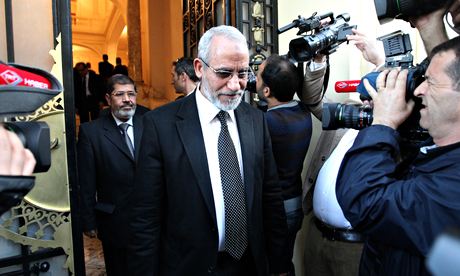Muslim Brotherhood leader Mohamed Badie among defendants in mass trial amid crackdown in which 16,000 arrested

Mohamed Badie (front) pictured with Mohamed Morsi in 2011: Badie is among the defendants in one mass trial. Photograph: Khaled Desouki/AFP/Getty Images
More than 1,200 men face the death sentence in Egypt, as a judge deliberates on whether to uphold the sentences he gave 529 defendants in March.
The leader of the Muslim Brotherhood, Mohamed Badie, whose colleague Mohamed Morsi was removed from Egypt's presidency last July, is among the defendants in one of two mass trials.
Amnesty International has said the case of the 529 men is the largest batch of simultaneous death sentences in living memory. Along with the other case, in which 683 have been sentenced to death for killing a policeman, it forms the latest instalment of a government crackdown during which at least 16,000 people have been arrested and more than 2,500 killed since the ousting of Morsi.
Prosecutors say the defendants in both cases are Brotherhood members who killed two police officers during nationwide violence last August. The 529 defendants are accused of lynching a policeman in Matay, a town in Minya province, southern Egypt. On the same day, 683 others – including the Brotherhood's Badie – are said to have killed another officer in the nearby town of Adwa.
But many of the defendants in both trials say they were neither present during the attacks, nor supporters of the Brotherhood. In some cases, they say they were not even in the province itself – and that they were reported to the police by informants acting on personal agendas.
Both verdicts would have been reached after just two court sessions in which defence lawyers said there was no time to assess thousands of pages of testimonies and court documents.
"There is nothing against me – no one has any evidence that I was there on that day," said Hagag Saber, a 34-year-old government electrician who is one of the 683 sentenced to death for the killing in Adwa. Currently at large, he claims he was in Cairo on the day of the attacks.
"There is no justice or integrity, nothing based on facts. Everything is based on an illegitimate investigation that took hearsay from people in the street," he said.
Saber's lawyer, Mohamed Abd-El Fatah Ali, said the judge – Saeed Youssef, who presided over both cases – could not have had time to read the thousands of pages of court documents relating to the case.
"There's no human who could read this amount of newspaper pages, let alone legal documents containing testimonies, in order to find the paragraph that relates to this case and these defendants in the time allowed," said Ali. "That would take three months."
Families have alleged that some defendants are not even mentioned in the documents.
One of Ali's colleagues, Ahmed Eid, was arrested because of personal differences with local policemen, his family has claimed. Previously a lawyer in the 529-strong case, Eid joined his clients in jail after the case had officially been referred to court. His wife said police arrested him because he had failed to pay them a bribe, and that investigators – with whom he was in daily contact on behalf of his clients – had never previously suggested he was involved in the case.
The sentences were reached despite an international campaign in which more than 1.5 million people signed a petition hosted by online activistsAvaaz that called for a commuting of the sentences.
But in Egypt the outcry has not been universal. Many see the 529 death sentences as a fitting revenge on the Brotherhood, who are blamed for a wave of militancy across Egypt in recent months.
"The outrage over the conviction of 529 terrorists is in itself an outrage," said one commentator in a state-run newspaper this month.
After the initial sentences on the 529 in March, Egypt's foreign ministry released a statement defending the court's integrity. The verdict was announced in the separate mass trial of the other 683. "The sentence was issued by an independent court after careful study of the case," the statement read.

No comments:
Post a Comment